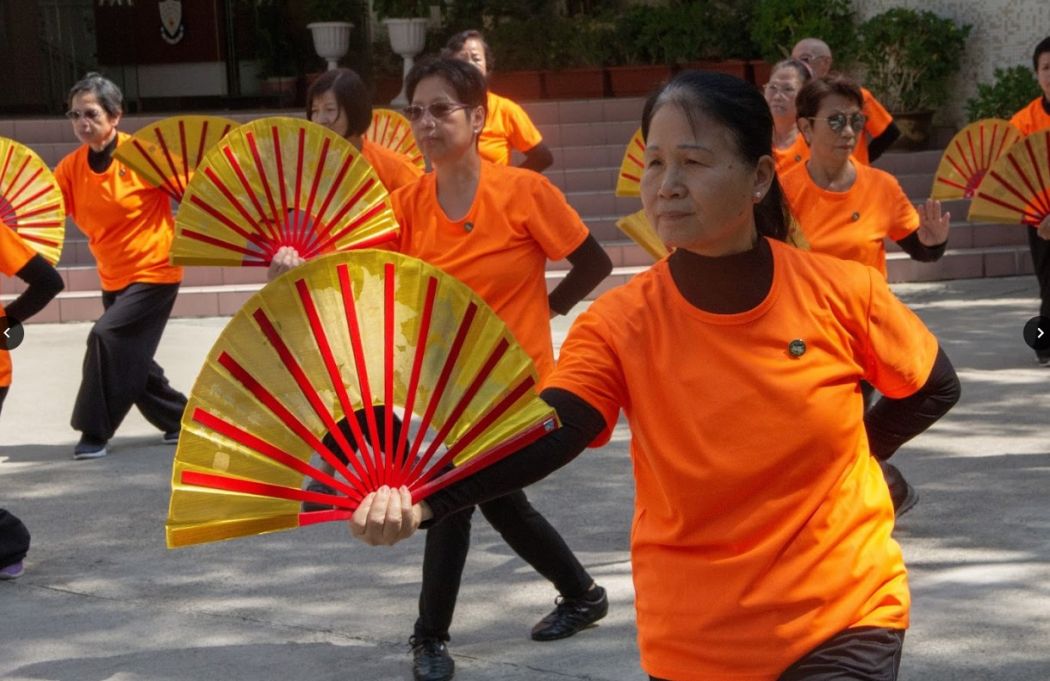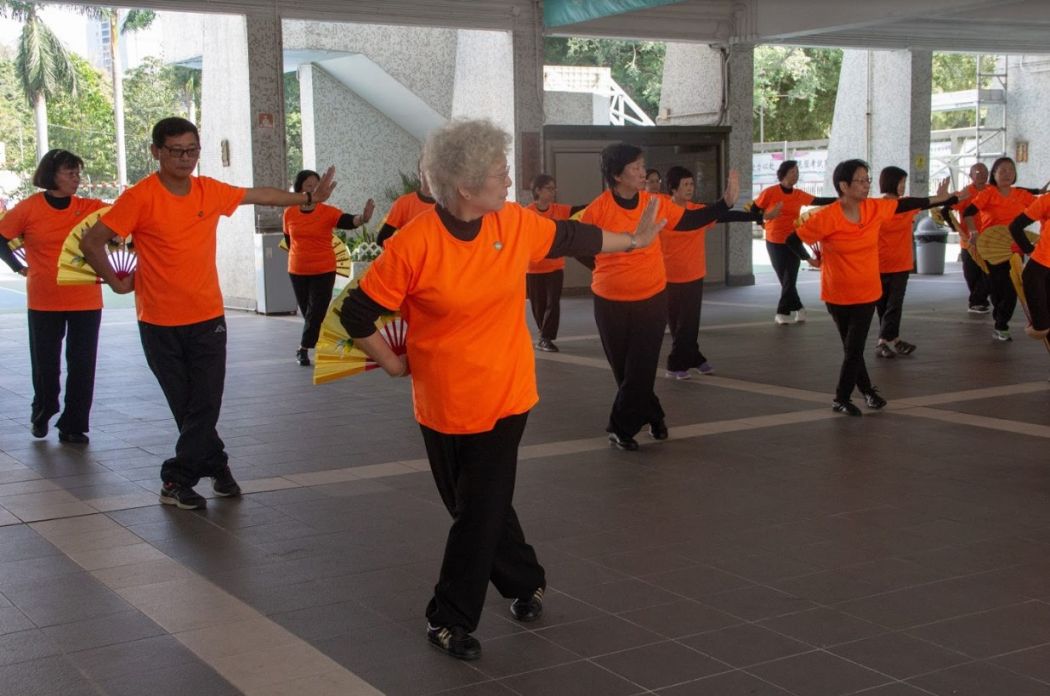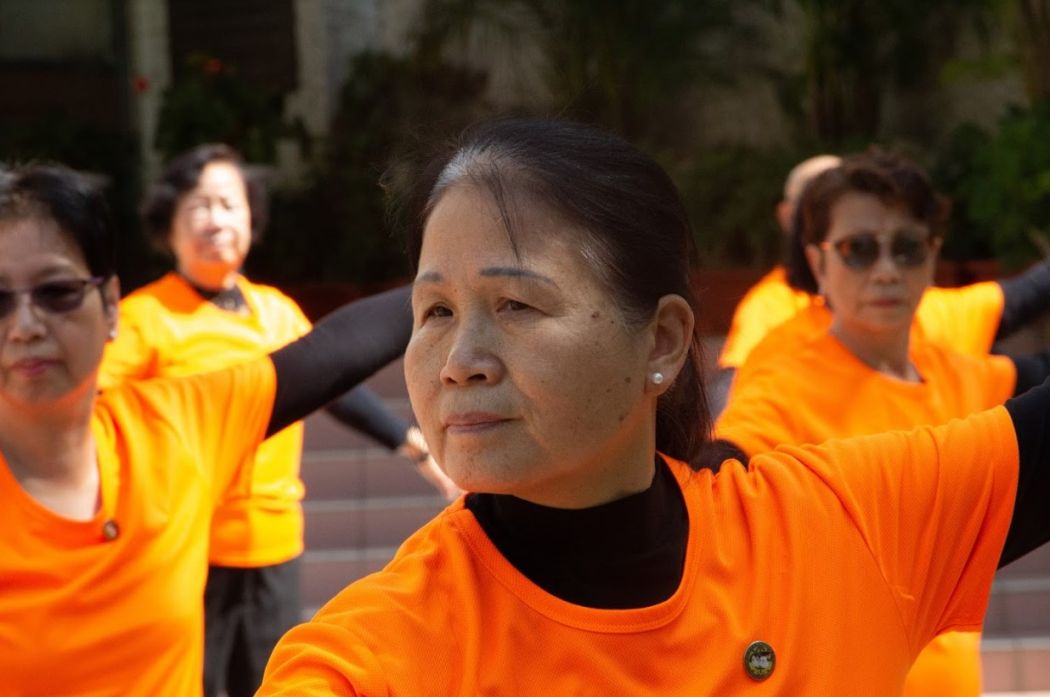It’s a sunny day in the outskirts of Tuen Mun when a group of white-haired ladies gather under the arches of a primary school. What they had promised was a kung fu performance.
Expectations abound of grannies leaping in the air, throwing fists towards one another, perhaps engaging in a bit of trash talk and heated staredowns. Like UFC but with walking sticks.

The reality of what unfolded was a delicate and rather majestic choreographed sequence of poses performed with silk fans and quiet elegance.
It might not have been the Bruce Lee style battle one expected, and yet still, it technically counts as part of the complex kung fu family of martial arts poses, better known as Tai Chi, that fosters good health and flexibility, and as such is highly suitable for older practitioners.
It draws on the performance dimension of the ancient martial art, and continues to unite the elderly in Hong Kong as in Chinese diaspora communities worldwide.
These ladies learn sequences that are shared around Tai Chi groups across Hong Kong, and which are sometimes performed at arenas by thousands at special events, some held at Kai Tak. Last year’s event took place on a particularly sweltering day, which unfortunately meant some participants wound up in hospital with heat stroke.

In Tuen Mun, where the 20 or so women, and one gentleman, get together to practise with their sifu, or teacher, it gives them something to do, helping to offset some of the monotony that can come with retirement.
For many, the window between retirement at 60 and 64 when welfare support kicks in, is an uncomfortable time of belt-tightening. This is especially true after Carrie Lam’s recent move to raise the age for those eligible for support under the Comprehensive Social Security Assistance Scheme in January.
“I’m most concerned about how the new regulation on elderly assistance will impact the younger generation,” says one of the ladies. “If the elderly don’t retire, that limits resources for young people to move up in their careers.”
Though they are not really a group of complainers – in fact, they are a rather demure and sweet bunch who pass around Ferrero Rochers after their session – they do say that life after retirement here can get a bit slow, especially as most aren’t eligible yet for the HK$2 public transport fare that will make travelling to Central much easier. And their Tai Chi clique helps offset that.
“Tai Chi makes life wonderful,” says 56-year-old Brenda.

Most of the ladies have in fact lived in Tuen Mun or nearby their whole lives and have noticed many changes through those years. One observer of these changes is the si fu’s assistant, Judy Lee, a convivial lady with curly white hair who, at 68, has been taking part in Tai Chi classes since 1998. In that time, rent has gone up as population numbers swelled.
The West Rail line arrived, connecting what had been otherwise been quite an isolated place. More and more buildings took up space in what had formerly not been a densely built-up district, and new families moved in.
Lee notes that while many newcomers have diversified the demographic landscape of the district, her crowd have mostly stayed put.
“We like to stay in our original community. You build up support that would take too much energy to establish somewhere else,” she says. In fact, Lee is so committed to her neighbourhood that she is already looking into where she will she have her ashes placed after she passes, and has found prices to have gone up here too.
“I still haven’t bought my spot yet, but prices are about 10,000 to 15, 000 HKD for a box,” she says cheerily.

Lee might be scrupulously planning ahead, but in the meantime, she puts in around three hours of Tai Chi training a week and has been doing so quite seriously for almost 20 years.
She first became curious about it when she saw a poster advertising the classes. She had recently had surgery and felt weak. Moving and training her body in a gentle way helped her to recover strength, and enjoy being in her own body again.
She never looked back, and with her si fu’s encouragement, underwent training so she could help teach the classes too.

Through that time period, Lee established a deep bond with her si fu, 67-year-old Wang Pui-jun, who has been training since she was in her 40s, and is passionate about making Tai Chi available to all. Her classes are free, and she is also involved in outreach programmes across the New Territories.
She started the courses when she was 60 and had to retire from the civil service. She initially tried to set up the programme with the help of the Leisure and Cultural Services Department, but that process proved far too unwieldy, so instead she went rogue.
Her community continues to grow, as more practitioners are drawn to both the community and the feeling of being connected to an ancient tradition that helps offset some of the effects of living in an ever-changing city.
“There aren’t that many opportunities for the elderly to feel connected to modern society,” says assistant Lee. “This helps with that disconnection.”
Kong Tsung-gan‘s new collection of essays – narrative, journalistic, documentary, analytical, polemical, and philosophical – trace the fast-paced, often bewildering developments in Hong Kong since the 2014 Umbrella Movement. As Long As There Is Resistance, There Is Hope is available exclusively through HKFP with a min. HK$200 donation. Thanks to the kindness of the author, 100 per cent of your payment will go to HKFP’s critical 2019 #PressForFreedom Funding Drive.

